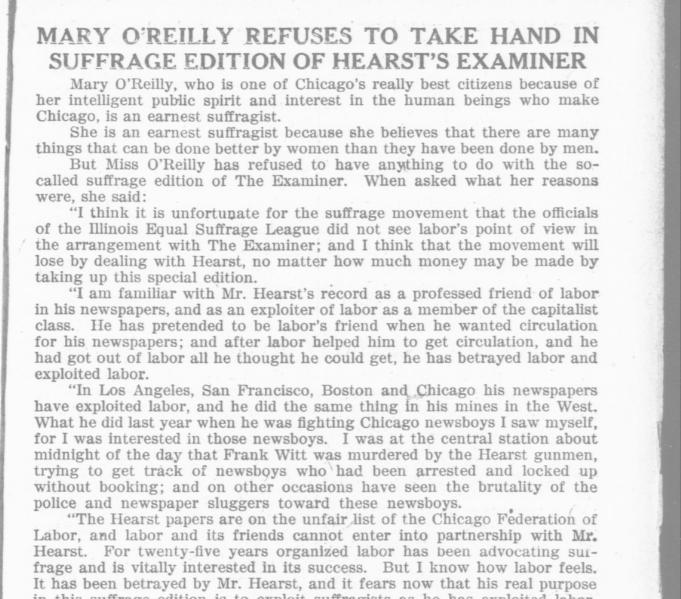|
Moderated by NW Okie! |
Volume 14 , Issue 422012Weekly eZine: (374 subscribers)Subscribe | Unsubscribe Using Desktop... |
Suffrage Movement & Hearst's Examiner Special Edition

Remember Mary O'Reilly when she refused to take a hand in Suffrage edition of Hearst's Examiner?
Mary O'Reilly, besides being an earnest suffragist, was one of Chicago's really best citizens because of her intelligent public spirit and interest in the human beings who made Chicago.
Mary refused to have anything to do with the so-called suffrage edition of "The Examiner." The Day Book news article dated 17 July 1913, Chicago, Illinois asked Mary what her reasons were, she told them:
"I think it is unfortunate for the suffrage movement that the officials of the Illinois Equal Suffrage League did not see labor's point of view in the arrangement with The Examiner; and I think that the movement will lose by dealing with Hearst, no matter how much money may be made by taking up this special edition.
"I am familiar with Mr. Hearst's record as a professed friend of labor in his newspapers, and as an exploiter of labor was a member of the capitalist class. he had pretended to be labor's friend when he wanted circulation for his newspapers; and after labor helped him to get circulation, and he had got out of labor all he thought he could get, he had betrayed labor and exploited labor.
"In Los Angeles, San Francisco, Boston and Chicago his newspapers have exploited labor, and he did the same thing in his mines in the West. What he did last year (1912) when he was fighting Chicago newsboys I saw myself, for I was interested i those newsboys. I was at the central station about midnight of the day that Frank Witt was murdered by the Hearst gunmen, trying to get track of newsboys who had been arrested and locked up without booking; and on other occasions have seen the brutality of the police and newspaper sluggers toward these newsboys.
"The Hearst papers are on the unfair list of the Chicago Federation of Labor, and labor and its friends cannot enter into partnership with Mr. Hearst. For twenty-five years organized labor has been advocating suffrage and is vitally interested in its success. But I know how labor feels. It has been betrayed by Mr. Hearst, and it fears now that his real purpose in this suffrage edition is to exploit suffragists as he has exploited labor. He hopes to gain an influence with the new voters, as he once gained an influence with labor voters, and then use that influence for a selfish purpose.
"It has already made a division in the ranks of women, for there are many of us who will have nothing to do with a suffrage edition of a Hearst paper. I don't mean that there would not be divisions among women voters as there have been among men, for the women of the profit-making class can never have the same point of view of the women wage-earners; and women will be partisans. At the same time there is so much we could do in municipal affairs by working together that I consider it very unfortunate that this division has come.
"There is so much we can do in the way of guarding the public health, abolishing child labor, having clean and wholesome schoolhouses, guarding against epidemics -- so many things that both club women and working women could accomplish that I regret this division at the outset.
"But there is nothing else we can do but preserve the integrity of labor organization and labor movement and we can't do that by going in business with Hearst, an exploiter and betrayer of labor, even for financial gain for the suffrage movement. So we will not contribute to the suffrage edition, we will not write for it, we will not sell it, we will not buy it. I am sorry the women got into it, because I think they did not understand what it meant when they signed a contract with Hearst."
| View or Add Comments (0 Comments)
| Receive
updates ( subscribers) |
Unsubscribe
| © . Linda Mcgill Wagner - began © 1999 Contact Me | |
